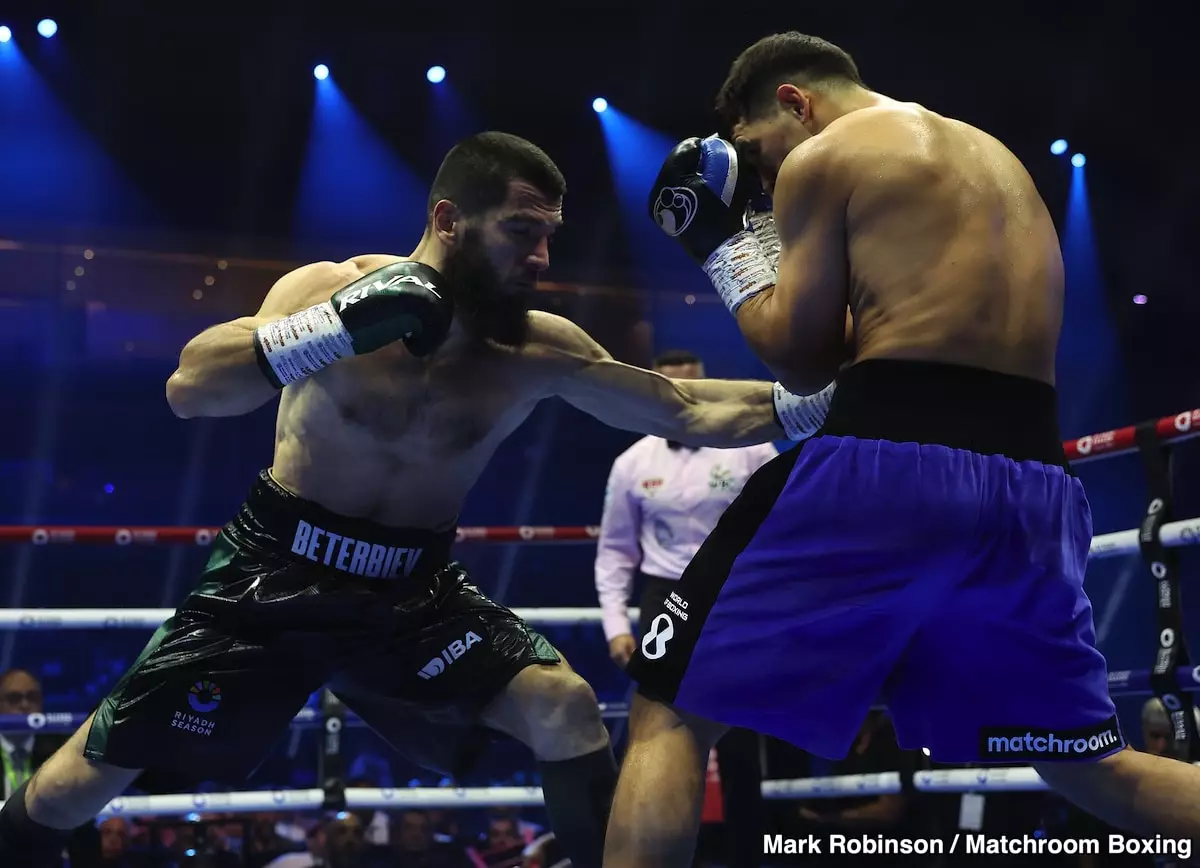Boxing, often dubbed the “sweet science,” is less about raw power and more about strategy, timing, and at times, a keen sense of opportunism. Recently, the discourse surrounding rising star David Benavidez and the fearsome, undisputed light heavyweight champion Artur Beterbiev has sparked debate about the ethics and tactics that underpin high-stakes boxing matchups. Former fighter Sergio Mora has publicly stated his belief that Benavidez might benefit from allowing Beterbiev to “age out” before facing him, a line of thinking that provides a window into the complex interplay of youth, skill, experience, and timing in the boxing world.
Artur Beterbiev stands as a colossus in the sport. With an impressive record of 21 wins, 20 of which have come via knockout, he has garnered a reputation not just for strength but for his explosive fighting style. As he approaches his 40th birthday, questions surrounding his longevity in the ring grow salient. Beterbiev’s raw ferocity belies the gentle passage of time that affects all fighters, raising the issue of whether age is a legitimate barrier or merely an opportunity for younger challengers.
Mora’s comments tap into a broader theme in boxing: the notion that seasoned athletes can become vulnerable with age. He argues that many champions have effectively been “aged out” by strategic competitors who wait until their opponents are less physically capable. This pattern becomes more pronounced in a sport where a fighter’s durability reflects years of damage and experience. Critics of this trend might argue that it lacks honor or sportsmanship; however, boxing is also a business, and maximizing one’s chances of victory is often prioritized over notions of gallantry.
David Benavidez, with a pristine record of 29-0 and 24 KOs, is widely considered a burgeoning heavyweight. His swift ascent is marked by impressive victories and an electric fighting style. Yet the question remains if he can capitalize on his youth to dethrone Beterbiev or if it would be more prudent to wait for the champ to decline physically. Mora insinuates there is risk in pursuing Beterbiev too soon; waiting might yield a more favorable outcome both in terms of health and potential trajectory in his career.
Recent history has shown that fighters sometimes take calculated steps to enhance their standing. Benavidez’s decision to wait two years before challenging David Morrell exemplifies a deliberate approach to managing his risks while also ensuring that he enters the ring at peak performance. The weight of expectations on Benavidez is magnified by the legacy of boxing being steeped in tales of underdog triumphs and slaying giants, such as Beterbiev.
Mora’s assertion that a rematch between Beterbiev and Dmitry Bivol must occur before Benavidez steps in is also crucial. The upcoming clash is poised to shape the landscape of the light heavyweight division significantly. If Bivol indeed manages to secure a convincing victory against Beterbiev, the entire narrative shifts; Benavidez’s chances against a potentially diminished Beterbiev become a moot point should Bivol emerge victorious. It’s not just about external perceptions but also the internal motivations of a fighter and how these challenges shape game plans.
The concept of “aging out” cannot be taken lightly—not just as a strategy but as a commentary on the brutal nature of boxing itself. It speaks to the intricate dynamics of human biology and the sport’s demand for peak physical performance. Mora’s comments serve as a reminder of the harsh realities many fighters face, weighed against their aspirations.
The ongoing conversation surrounding Benavidez and Beterbiev embodies the quintessential battle in boxing: the delicate balance between seizing opportunities and exercising prudence. As Benavidez contemplates his next steps, it will be essential for him to consider not just Beterbiev’s formidable presence but also the broader implications of timing and strategy in achieving greatness. In a sport where the stakes are continually raised, understanding when to engage and when to hold back could define a legacy. Ultimately, the ring is a chessboard of flesh and spirit where intellect might just be the most valuable asset.

